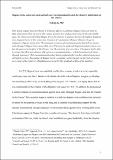Files in this item
Magna Carta, canon law and pastoral care : excommunication and the church's publication of the charter
Item metadata
| dc.contributor.author | Hill, Felicity Gemma | |
| dc.date.accessioned | 2019-02-01T17:30:05Z | |
| dc.date.available | 2019-02-01T17:30:05Z | |
| dc.date.issued | 2016-11 | |
| dc.identifier | 257578276 | |
| dc.identifier | 595c51f6-fe95-4dec-89b5-4fec625a8977 | |
| dc.identifier | 84978492634 | |
| dc.identifier.citation | Hill , F G 2016 , ' Magna Carta, canon law and pastoral care : excommunication and the church's publication of the charter ' , Historical Research , vol. 89 , no. 246 , pp. 636-650 . https://doi.org/10.1111/1468-2281.12151 | en |
| dc.identifier.issn | 0950-3471 | |
| dc.identifier.other | ORCID: /0000-0001-8435-7004/work/63046281 | |
| dc.identifier.uri | https://hdl.handle.net/10023/16987 | |
| dc.description.abstract | This article argues that the church's strenuous efforts to publicize Magna Carta can only be fully understood when viewed in the context of canon law and pastoral care. The automatic sentence of excommunication that fell on anyone who infringed Magna Carta meant that every Christian in medieval England needed to know not just the general principles of the charter, but the contents of every clause. Clergymen had a duty to ensure that their parishioners did not unwittingly incur the sanction, thereby endangering their souls. Thus the threat of excommunication had a profound effect on the political awareness of English society, as a result of the church's obligation to look out for the spiritual welfare of its members. | |
| dc.format.extent | 15 | |
| dc.format.extent | 244143 | |
| dc.language.iso | eng | |
| dc.relation.ispartof | Historical Research | en |
| dc.subject | BR Christianity | en |
| dc.subject | BDC | en |
| dc.subject | R2C | en |
| dc.subject.lcc | BR | en |
| dc.title | Magna Carta, canon law and pastoral care : excommunication and the church's publication of the charter | en |
| dc.type | Journal article | en |
| dc.contributor.institution | University of St Andrews. School of History | en |
| dc.identifier.doi | 10.1111/1468-2281.12151 | |
| dc.description.status | Peer reviewed | en |
| dc.date.embargoedUntil | 2018-06-27 |
This item appears in the following Collection(s)
Items in the St Andrews Research Repository are protected by copyright, with all rights reserved, unless otherwise indicated.

